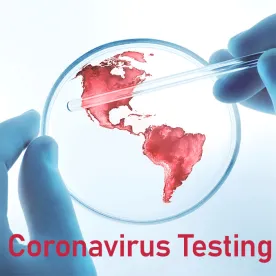The U.S. Food and Drug Administration (FDA) issued two Emergency Use Authorizations (EUA) for commercially distributed COVID-19 diagnostic tests at the end of last week. The first authorization was issued to Roche Molecular Systems, Inc., for its cobas SARS-CoV-2 Test, and the second issued the following day to Thermo Fisher Scientific, Inc., for its TaqPath COVID-19 Combo Kit. Both tests are for the qualitative detection of SARS-CoV-2, the virus that causes coronavirus disease 2019 (COVID-19). FDA granted the authorizations within 24 hours of receiving the requests.

Both tests are authorized for use in the U.S. by laboratories certified under the Clinical Laboratory Improvement Amendments of 1988 (CLIA), 42 U.S.C. §263a, to perform high complexity tests. Roche’s test also is authorized for use in CLIA labs performing moderate complexity tests. To expedite access to the test, FDA did not object to Roche pre-positioning its test so that labs could be ready to initiate testing immediately upon issuance of the EUA.
During the COVID-19 outbreak, FDA has exercised its emergency use powers to expedite development of, and access to, diagnostic tests. FDA may issue an EUA to permit the use of certain medical products that are not approved in emergency situations to diagnose, treat, or prevent a disease or condition. Since the outbreak, more than 80 test developers have sought FDA’s assistance with development and validation of tests that they plan to submit through the EUA process. In addition, more than 30 laboratories have notified FDA that they are testing, or intend to begin testing soon, laboratory developed tests (LDTs) for COVID-19.
The EUA announcements come on the heels of other significant actions the Agency has taken this week, and in the past few weeks, to respond to, and mitigate, the impact of COVID-19.
-
Strategies for Access to Respirators, Surgical Masks and Gowns. In a joint effort, the FDA and the Centers for Disease Control and Prevention (CDC) took steps to make more respirators available to health care personnel. The FDA granted the CDC’s request for an EUA to allow health care personnel to use industrial respirators, not currently regulated by the FDA to be used in a healthcare setting, during the COVID-19 outbreak. FDA also announced a conservation strategy to assist healthcare organizations in implementing procedures for using personal protective equipment (PPE), such as surgical masks, surgical and isolation gowns, and surgical suits, which may be in short supply during the COVID-19 outbreak.
-
Supply Chain Monitoring. In addition to taking actions to increase the supply of diagnostic tests and PPE in healthcare settings, FDA is monitoring closely the supply of medical devices and possible drug shortages that may result from the COVID-19 outbreak. Many medical devices, and their components, are sourced from China, and a significant number of U.S. prescription drugs are formulated with active pharmaceutical ingredients (API) manufactured in Asia. A single manufacturing facility in China, for example, could supply the API for multiple U.S. drugs. Disruptions at manufacturing facilities in Italy, and especially northern Italy, may affect the supply of finished drug products in Europe and the U.S. FDA has been encouraging manufacturers to inform the agency of potential drug shortages before they happen.
-
Postponement of Foreign Inspections. As reported here, FDA has postponed most ex-US (e., foreign) inspections through April. FDA will consider conducting “mission-critical” inspections on a case-by-case basis. The impact will be felt especially by companies with planned pre-approval inspections because a delayed inspection of a manufacturing facility could mean a delay in product approval.
-
Expediting Development of Laboratory Developed Tests (LDTs). To pave the way for expedited development of COVID-19 diagnostics, FDA announced a new policy in late February to permit use of validated COVID-19 diagnostics before FDA issuance of an EUA for the diagnostic. The policy describes the circumstances under which the FDA does not intend to object to the use of COVID-19 diagnostic tests while the laboratories are pursuing an EUA with the FDA. Click here for FDA’s FAQs on diagnostic testing for SARS-CoV-2.
-
Clearing the Market of Fraudulent Products Claiming to Treat or Prevent COVID-19. The FDA and the Federal Trade Commission issued warning letters to seven companies selling fraudulent COVID-19 products on March 9, 2020. The fraudulent products included teas, essential oils, tinctures and colloidal silver making unfounded treatment and prevention claims.
To read more about the FDA’s actions to address COVID-19, click here.



 />i
/>i

